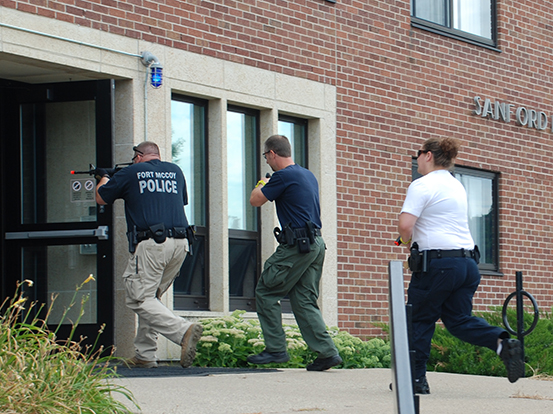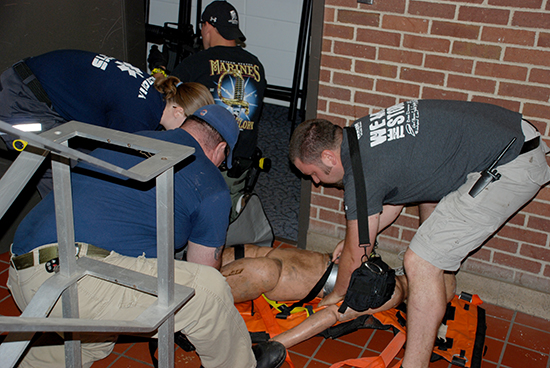Posted 8:53 p.m. Tuesday, July 30, 2013
UW-L Police Services officers say it is important to train with agencies outside campus to gain experience working together in case it is ever needed.
 In a training scenario officers enter Sanford Hall.[/caption]
Western Technical College and UW-La Crosse teamed up this week to coordinate an active shooter training Monday, July 29 through Thursday, Aug. 1 at various locations on the UW-L campus. UW-L holds multiple active shooter trainings throughout the year for campus police; however, this is the first time Western and UW-L co-organized a training and invited law enforcement from throughout the state.
“You train a lot so that when something happens, reactions kick in rather than emotions,” explains Sgt. Scott McCullough, UW-L Police Services. “The more you train, the better you’ll be able to handle the situation when it actually happens.”
Training also provides officers the opportunity to work with people from agencies and divisions they may have never worked with before and discuss what went well and what didn’t during previous incidents, explains UW-L Police Chief Scott Rhode. UW-L and Western have never had an active shooter on campus; however, a UW-L student was arrested and apprehended in April after carrying an unloaded shotgun on campus. And, in May, police responded to what was reported as shots fired at Western, but the noise turned out to be part of a class project.
[caption id="attachment_25166" align="alignright" width="347"]
In a training scenario officers enter Sanford Hall.[/caption]
Western Technical College and UW-La Crosse teamed up this week to coordinate an active shooter training Monday, July 29 through Thursday, Aug. 1 at various locations on the UW-L campus. UW-L holds multiple active shooter trainings throughout the year for campus police; however, this is the first time Western and UW-L co-organized a training and invited law enforcement from throughout the state.
“You train a lot so that when something happens, reactions kick in rather than emotions,” explains Sgt. Scott McCullough, UW-L Police Services. “The more you train, the better you’ll be able to handle the situation when it actually happens.”
Training also provides officers the opportunity to work with people from agencies and divisions they may have never worked with before and discuss what went well and what didn’t during previous incidents, explains UW-L Police Chief Scott Rhode. UW-L and Western have never had an active shooter on campus; however, a UW-L student was arrested and apprehended in April after carrying an unloaded shotgun on campus. And, in May, police responded to what was reported as shots fired at Western, but the noise turned out to be part of a class project.
[caption id="attachment_25166" align="alignright" width="347"] Officers from various Law enforcement agencies worked together during the scenarios.[/caption]
“Despite the fact that it wasn’t an emergency situation at Western, it was still very eye-opening for police officers and our campus security and staff,” says Kellie McElroy, Western’s Law Enforcement Training Coordinator. “It proved that these scenario trainings are a necessity.”
Some people have the attitude that if campus had one incident with a gun on campus once, it won't happen again, says Rhode.
“The nature of an active shooter is you never know when it’s going to happen, so you always need to train and be prepared.”
Officers from various Law enforcement agencies worked together during the scenarios.[/caption]
“Despite the fact that it wasn’t an emergency situation at Western, it was still very eye-opening for police officers and our campus security and staff,” says Kellie McElroy, Western’s Law Enforcement Training Coordinator. “It proved that these scenario trainings are a necessity.”
Some people have the attitude that if campus had one incident with a gun on campus once, it won't happen again, says Rhode.
“The nature of an active shooter is you never know when it’s going to happen, so you always need to train and be prepared.”